 St. Camillus worships the Child Jesus, altar painting in the Chapel of Relics, ‘St. Mary of Heaven’, Verona
St. Camillus worships the Child Jesus, altar painting in the Chapel of Relics, ‘St. Mary of Heaven’, Verona
Dio ha rivelato la pienezza dell’amore nel mistero dell’Incarnazione; in Cristo Gesù si sono manifestate la bontà di Dio Salvatore nostro e la sua umanità (Tit 3,4). Assumendo la natura umana Cristo, con solidarietà soprannaturale, ha legato a sé, come una famiglia, l’intero genere umano.
Costituzione – Camilliani, 3
God revealed the fullness of love in the mystery of the Incarnation; in Jesus Christ, the kindness of God our Saviour and his humanity has become manifest (Tit 3:4). In assuming human nature, Christ, in supernatural solidarity, has united to himself all humanity as a family.
Constitution – Camilllians, 3
Dieu nous a révélé la plénitude de l’amour dans le mystère de l’incarnation; en Jésus, ont été manifestées
la bonté de Dieu notre Sauveur et son humanité (Tit 3,4). En assumant la nature humaine, il s’est uni, par solidarité surnaturelle, comme une famille, l’humanité toute entière.
Dios ha revelado la plenitud del amor en el misterio de la Encarnación; en Cristo Jesús se ha manifestado
la bondad de Dios nuestro Salvador y su humanidad (Tit 3,4). Cristo, asumiendo la naturaleza humana, ha unido a sí, con solidaridad sobrenatural, a todo el género humano como una sola familia.
Constitución – Camilos, 3
Happy Christmas!
INTENTION AND OATH OF THE FIRST ‘SERVANTS OF THE SICK’ WHEN RECEIVING THE RED CROSS
Pope Sixtus V granted to the religious the right to wear as a symbol and distinctive sign a red cross of cloth on their chests. The Brief is of 26 June 1586, ‘Cum nos nuper’. The formulas of the intention and oath were used from 1586 to 1591.
The candidate – according to a liturgy invented by Camillus – after taking part in the celebration of the Eucharist, kneeled down in front of the altar and pronounced the following two formulas. A red cross was then placed on his chest while his confreres sung: ‘Who wants to be my follower should take up his cross and follow me’ and ‘As for me, may there be no other boast than the cross of our Lord Jesus Christ’.
Almighty God, my creator, my mercy, father of my Lord Jesus Christ, I give infinite thanks to you because through your goodness you deigned to call me to your holy service. And I, for love of you, here in the presence of your divine majesty and all the heavenly Court, with all the affection of my heart and my soul, propose to observe chastity, poverty and obedience and to serve the sick poor, your children and my brethren, for all the time of my life, with the greatest charity of which I am capable, helped by your divine grace. Thus by the love that led you to send your son into the world to die for mankind (and he said that he had come to bring fire to the earth, and wanted nothing else that it should be already lit), I pray to you that you keep my heart alight with the fire of such love without it ever going out so that I may persevere in this holy work and, persevering, reach heavenly glory, so as to be able to enjoy and praise, in eternity, with your chosen. Amen.
My Lord Jesus, by the very great wish that I have to observe this holy intention, and to arm myself against future temptations, in your divine presence and before the whole of the Court of Heaven I swear on the holy Gospel that every time I may think of leaving the Congregation (may God never permit this!), before distancing myself I will retire to a room for some days, according to the time that my Superior grants me. There I will commend myself to your divine Majesty and then I will do everything that I will think best for the salvation of my soul. Thus may the Lord and the holy Gospels of Jesus Christ help me!
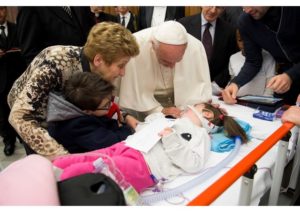 The message for the 26th World Day of the Sick
The message for the 26th World Day of the Sick
THE PROVINCE OF BRAZIL
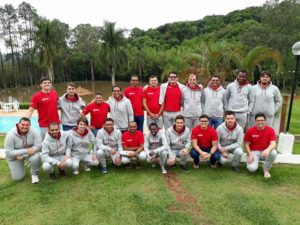 On the new web site of the Camillian Province of Brazil it is possible to consult the first information bulletin of the religious of Brazil: http://www.camilianos.org.br/conteudo/informativo
On the new web site of the Camillian Province of Brazil it is possible to consult the first information bulletin of the religious of Brazil: http://www.camilianos.org.br/conteudo/informativo
The Camillians of the Camillian Province of Brazil on 2-5 November of this year celebrated the annual meeting of providers of formation and animators of vocations (4) and the young men in formation (17).
On the Occasion of the Fortieth Anniversary of the Review O Mundo da Saúde: some Historical Memories!
 By Leo Pessini, Superior General
By Leo Pessini, Superior General
http://www.revistamundodasaude.com.br/index.php/principal
In the year 2017, as regards the world of Camillian publications, there is an important event that should be remembered and celebrated: the fortieth anniversary of the uninterrupted publication of the review O Mundo da Saúde. This is a scholarly publication connected to the educational field of the university world of the Camillian Province of Brazil. It was with great pleasure and a sense of honour that I accepted the invitation of Fr. João Batista Gomes de Lima, the current chief editor of this publication and the rector of the University of the São Camilo Centre (SP), to write an article for the edition commemorating the fortieth anniversary of this publication. I will not focus on producing an article of a scholarly character, which others will certainly write or which I myself will prepare for another occasion. Rather, I will take the liberty of bringing together and presenting historical reminiscences about some of the most important facts that have characterised these last forty years. CONTINUE READING HERE
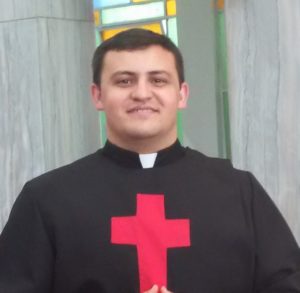 The Superior General, with the agreement of the members of the General Cosulta, has admitted to the perpetual profession of religious vows the temporary professed religious Elielton José da Silva, of the Camillian Province of Brazil.
The Superior General, with the agreement of the members of the General Cosulta, has admitted to the perpetual profession of religious vows the temporary professed religious Elielton José da Silva, of the Camillian Province of Brazil.
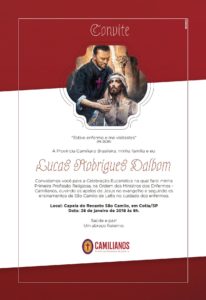 The religious of the Province of Brazil have announced the first religious profession of the novice Lucas Rodriguez Dalbom which will be celebrated on 28 January 2018 at the ‘Recanto São Camilo’ of Cotia, San Paolo (Brazil).
The religious of the Province of Brazil have announced the first religious profession of the novice Lucas Rodriguez Dalbom which will be celebrated on 28 January 2018 at the ‘Recanto São Camilo’ of Cotia, San Paolo (Brazil).
THE PROVINCE OF NORTH ITALY, SEVESO
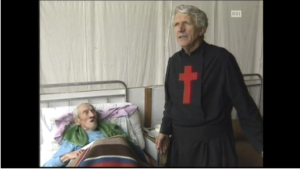 Brother Ettore, the cause for beatification and canonisation has been opened
Brother Ettore, the cause for beatification and canonisation has been opened
On Tuesday 19 December, at the Casa Betania delle Beatitudini of Seveso, the Archbishop of Milan, Msgr. Mario Delpini, opened the process relating to the Camilian Servant of God Br. ETTORE BOSCHINI.
We here publish the edict issued by the Diocesan Service for the Causes of Saints.
THE PROVINCE OF NORTH ITALY, CREMONA
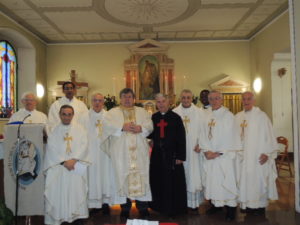 On Sunday 19 November 2017, at the Camilllian community of the St. Camillus Nursing Home of Cremona, Br. Giovanni Scarpa celebrated the fiftieth anniversary of his religious profession. The celebration of the Eucharist was presided over by the Superior General and Fr. Bruno Nespoli, the Provincial Superior, gave the homily. Some family relatives and the religious of the community and others who came from the communities of Trento and Pavia took part in the joy of the event at the side of Br. Giovanni. A large number of friends and faithful who over the years have met Br. Scarpa at the nursing home were present at the celebration of the Eucharist.
On Sunday 19 November 2017, at the Camilllian community of the St. Camillus Nursing Home of Cremona, Br. Giovanni Scarpa celebrated the fiftieth anniversary of his religious profession. The celebration of the Eucharist was presided over by the Superior General and Fr. Bruno Nespoli, the Provincial Superior, gave the homily. Some family relatives and the religious of the community and others who came from the communities of Trento and Pavia took part in the joy of the event at the side of Br. Giovanni. A large number of friends and faithful who over the years have met Br. Scarpa at the nursing home were present at the celebration of the Eucharist.
THE DELEGATION OF VIETNAM
Celebration of the 25th anniversary of the arrival of the Camillians in Vietnam MESSAGE FROM THE GENERAL SUPERIOR
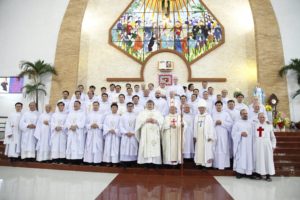 Today December 12th, 2017, the Camillian Delegation in Vietnam celebrated the 25th anniversary of its presence in Vietnam at Dong Tien Catholic Church. This event was the joy not only for the Delegation but also for the poor sick and for everyone.
Today December 12th, 2017, the Camillian Delegation in Vietnam celebrated the 25th anniversary of its presence in Vietnam at Dong Tien Catholic Church. This event was the joy not only for the Delegation but also for the poor sick and for everyone.
From early morning, we welcomed Fr. General Leocir Pessini, Fr. Pairat Sriprasert the provincial superior of Thai province, Fr. Stephen Foster the provincial of Anglo-Irish province, Fr. Alfréd György the Delegate of Austrian Delegation, representatives from Camillian Provinces, Delegations, guests who were priests, religious and the faithful from many places came to participate the celebration.
The presider of Mass was Archbishop Paul Bui Van Doc of Saigon Archdiocese, and the homilist was Bishop Peter Nguyen Van Kham of Mỹ Tho Diocese.
THE DELEGATION OF TAIWAN
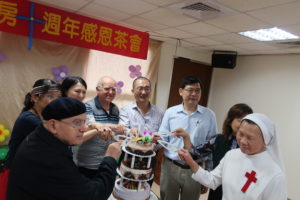 3 November 2017. A religious ceremony was organised at St. Mary’s Hospital to celebrate the tenth anniversary of the opening of the hospice at that health-care institution. This was followed by a number of commemorative speeches. The hospice is unanimously seen as the precious pearl of the hospital, an expression of its high quality care and its respect for the dignity of the dying, even though it continues to have difficulties at an economic level.
3 November 2017. A religious ceremony was organised at St. Mary’s Hospital to celebrate the tenth anniversary of the opening of the hospice at that health-care institution. This was followed by a number of commemorative speeches. The hospice is unanimously seen as the precious pearl of the hospital, an expression of its high quality care and its respect for the dignity of the dying, even though it continues to have difficulties at an economic level.
4 November 2017. To celebrate the thirtieth anniversary of the St. Camillus Centre for people with handicaps, a race was organised: a marathon with more than 1,000 participants. Various gadgets were sold to collect funds and stabilise the financial situation of the centre.
7 November 2017. About fifty Chinese medical doctors who work in the USA visited our St. Mary’s Hospital for an exchange of experiences and knowledge.
16 November 2017. For the feast day of Our Lady of Health, in the afternoon, the first thanksgiving was celebrated by the two new Vietnamese Camillian priests. They celebrated the Eucharist in the new St. Camillus Church which on the occasion of the feast day of Our Lady of Health was proclaimed a new diocesan sanctuary by the Bishop of Taipei.
ROME – THE ‘CHURCH OF ST. MARY MAGDALENE’ 16 NOVEMBER 2017: FEAST DAY OF MARY ‘SALUS INFIRMORUM’
 On Thursday 16 November 2017 the feast day of Mary ‘Salus Infirmorum’ was celebrated at the Church of St. Mary Magdalene. Our church/rectory is the Mother church of the Order and conserves not only the spiritual memory and the body of our Founder Father, St. Camillus de Lellis, but also seeks to cultivate and promote devotion to Mary Salus Infirmorum.
On Thursday 16 November 2017 the feast day of Mary ‘Salus Infirmorum’ was celebrated at the Church of St. Mary Magdalene. Our church/rectory is the Mother church of the Order and conserves not only the spiritual memory and the body of our Founder Father, St. Camillus de Lellis, but also seeks to cultivate and promote devotion to Mary Salus Infirmorum.
From the context of Marian elements present in the life of St. Camillus, one may deduce that the Blessed Virgin Mary for him was above all else the Mother of Holiness, a guarantees of the health of the body and the spirit, and every appointment of grace in him – his conversion, the original idea to found the Order, his thoughts about pain and suffering – found its source in a profound Marian dimension.
This feast day is especially dear to the spiritual tradition of our Order and to the many faithful who every day stand in prayer in front of the icon that we have kept for some centuries in our church.
The feast day will be preceded by a triduum of meditation and prayer.
The celebration of the Eucharist was presided over by His Excellency Msgr. José Rodríguez Carballo, the Secretary of the Congregation for Institutes of Consecrated Life and Societies of Apostolic Life, with the presence of Msgr. Séraphin François Rouamba, the Archbishop of Koupéla (Burkina Faso), of the Superior General, of all the members of the General Consulta of the Order, and of twenty-three religious of the Camillian communities of Rome. The faithful of the Church of St. Mary Magdalene and the Daughters of St. Camillus animated the liturgy. PHOTOGALLERY
Cf. Prayer to our lady of health
Cf. Mary Health of the Sick in the spiritual experience of St. Camillus (by Fr. Felice Ruffini)
18 NOVEMBER 2017: NATIONAL BROADCAST ON RAI1 FROM THE ‘CHURCH OF ST. MARY MAGDALENE’
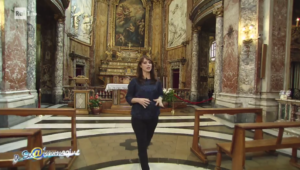 Film of our Church of St. Mary Magdalene was broadcast on Saturday afternoon 18 November 2017 on Rai Uno in the context of the programme ‘A Sua immagine’ (‘In his Image’) and the series ‘Le radici della fede’ (‘The Roots of Faith’). The Baroque art of our church and its sacristy were a magnificent setting to present St. Camillus and his passion for the sick, an image of Christ, at a national level.
Film of our Church of St. Mary Magdalene was broadcast on Saturday afternoon 18 November 2017 on Rai Uno in the context of the programme ‘A Sua immagine’ (‘In his Image’) and the series ‘Le radici della fede’ (‘The Roots of Faith’). The Baroque art of our church and its sacristy were a magnificent setting to present St. Camillus and his passion for the sick, an image of Christ, at a national level.
The broadcast can be seen free on the internet site of the RAI: http://www.raiplay.it/
19 NOVEMBER 2017: THE WORLD DAY OF THE POOR
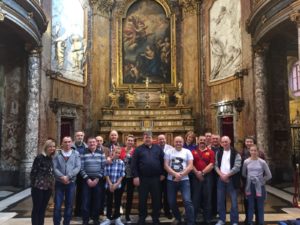 Our Polish Camillian confrere Fr. Hubert Bienek of the Camillian community of Ursus (Warsaw) celebrated the Eucharist in our Church of St. Mary Magdalene with some fellow workers and ‘poor’ guests’ who welcome and serve in the community, working for their reintegration into their families, the world of work, and society. They were invited by Pope Francis to celebrate and pray with him in St. Peter’s Square on the occasion of the World Day of the Poor (19 November 2017).
Our Polish Camillian confrere Fr. Hubert Bienek of the Camillian community of Ursus (Warsaw) celebrated the Eucharist in our Church of St. Mary Magdalene with some fellow workers and ‘poor’ guests’ who welcome and serve in the community, working for their reintegration into their families, the world of work, and society. They were invited by Pope Francis to celebrate and pray with him in St. Peter’s Square on the occasion of the World Day of the Poor (19 November 2017).
Cf. LOVE NOT IN WORD BUT IN DEED. MESSAGE OF THE HOLY FATHER FRANCIS for the FIRST WORLD DAY OF THE POOR, XXXIII Sunday of Ordinary Time, 19 November 2017.
8 DECEMBER 2017: RENEWAL OF RELIGIOUS VOWS ON THE SOLEMNITY OF THE IMMACULATE CONCEPTION OF MARY
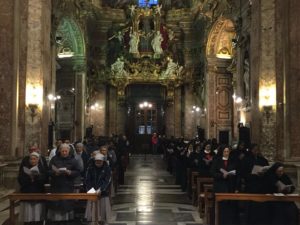 Camillians, Daughters of St. Camillus, women Ministers of the Sick, Handmaids of the Incarnation and women Missionaries of the Sick ‘Christ the Hope’, together at the Church of St. Mary Magdalene, in the afternoon of the solemnity of the Immaculate Conception of Mary, renewed – in line with a long tradition – their religious vows of consecration to the Lord, in the service of the Church of care for sick people.
Camillians, Daughters of St. Camillus, women Ministers of the Sick, Handmaids of the Incarnation and women Missionaries of the Sick ‘Christ the Hope’, together at the Church of St. Mary Magdalene, in the afternoon of the solemnity of the Immaculate Conception of Mary, renewed – in line with a long tradition – their religious vows of consecration to the Lord, in the service of the Church of care for sick people.
THE PRO.SA FOUNDATION
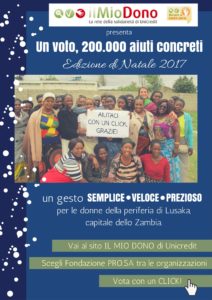 Once again Unicredit has decided to renew the ‘1 vote 200,000 examples of concrete help’ initiative to support the non-profit organisations that adhere to the ‘My Gift’ service, and has made available a total sum of €uro 200,000.00.
Once again Unicredit has decided to renew the ‘1 vote 200,000 examples of concrete help’ initiative to support the non-profit organisations that adhere to the ‘My Gift’ service, and has made available a total sum of €uro 200,000.00.
From 1 December to 22 January 2018 VOTE AND MAKE PEOPLE VOTE for the Pro.Sa Foundation.
Go to the link https://www.ilmiodono.it/it/votazione/?idorg=619 and vote through your Facebook, Google +, Twitter profile or by E-mail.
The more clicks we receive the greater the support we will be able to give to women on the outskirts of Lusaka in Zambia.
THE PROVINCE OF SICILY AND NAPLES
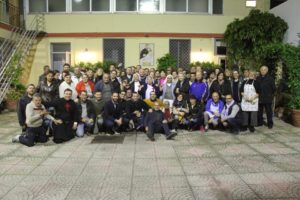 The World Day of the Poor with a Camillian ‘flavour’
The World Day of the Poor with a Camillian ‘flavour’
At our ‘St. Camillus’ welcome centre of Acireale, Catania, Br. Carlo Mangione and the Camillian religious, with the people who work with them and volunteers, truly ‘solemnised’ this World Day with ‘three days’ of events, public debates, celebrations and prayers in order to sensitise the civil and ecclesial community to this urgent social question which is constantly growing in importance.
During these three days, free health care was intensified for all the ‘friends of the table’ (a table that every day provides 50-60 meals) who every day are cleaned (the offer of a shower and a change of underclothes), cared for (the offer of support at a centre for listening), and given food to end their hunger. During these days, as well, some American military personnel stationed at the base of Signonella offered their help and their abilities, above all in the health-care field, to offer their support ‘to the civil community that hosts them in their own land’. READ HERE
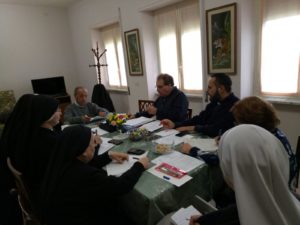 The Provincial Commission of the Province of Sicily and Naples, which organises Camillian missions, met on 6 November 2017 at the generalate house of the women Ministers of the Sick of St. Camillus. The following were present: Father Vincenzo Capozxo, Fr. Rosario Messina, and Fr. Alfredo Tortorella; Sr. Assunta Di Salvo and Sr. Tipthara Kupraseart of the women Ministers of the Sick; and Sr. Concettina Carlino of the Daughters of Charity of the Most Precious Blood, together with Sr. Laura and Sr. Fernanda.
The Provincial Commission of the Province of Sicily and Naples, which organises Camillian missions, met on 6 November 2017 at the generalate house of the women Ministers of the Sick of St. Camillus. The following were present: Father Vincenzo Capozxo, Fr. Rosario Messina, and Fr. Alfredo Tortorella; Sr. Assunta Di Salvo and Sr. Tipthara Kupraseart of the women Ministers of the Sick; and Sr. Concettina Carlino of the Daughters of Charity of the Most Precious Blood, together with Sr. Laura and Sr. Fernanda.
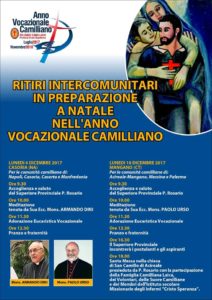 Programme of the inter-community retreat in preparation for Christmas during the Camillian Year of Vocations.
Programme of the inter-community retreat in preparation for Christmas during the Camillian Year of Vocations.
Programme of the Camillian parish mission of Santa Maria Stella Maris – Manfredonia.
THE PROVINCE OF SPAIN
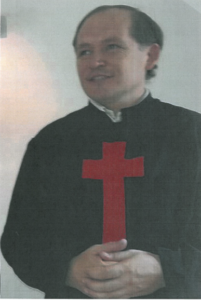 The Superior General has admitted to the perpetual profession of religious vows Brother Miguel Angel Sacco, a Camillian of the Province of Spain, the Delegation of Argentina.
The Superior General has admitted to the perpetual profession of religious vows Brother Miguel Angel Sacco, a Camillian of the Province of Spain, the Delegation of Argentina.
‘Our founders were moved by the Spirit and were not afraid to soil their hands with everyday life, with the problems of the people, courageously moving along the geographical and existential peripheries. They did not halt in the face of obstacles and the misunderstandings of others, because they kept in their heart the astonishment over the encounter with Christ. They did not tame the grace of the Gospel; they always had in their heart a healthy apprehension for the Lord, a heartrending desire to bring him to others, as Mary and Joseph did in the temple. We too are called today to make prophetic and courageous choices’.
Pope Francis, FEAST DAY OF THE PRESENTATION OF THE LORD – XX WORLD DAY OF CONSECRATED LIFE
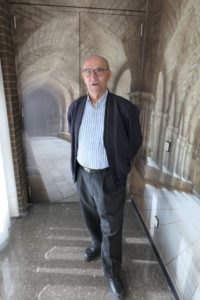 Father Dionisio Manso, his life of dedication and service for the sick.
Father Dionisio Manso, his life of dedication and service for the sick.
After over thirty years of service in the community of Seville, Fr. Dionisio Manso will begin a new mission at the community of San Pere de Ribes. The Province of Spain, its family and friends thank God for his generosity and dedication to the sick and the Church over all these years, in particular in the community of Seville where he has spent most of his Camillian ministry.
THE VICE-PROVINCE OF PERU
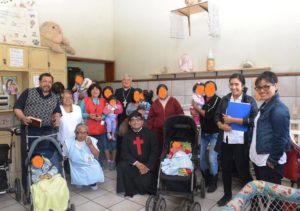 Pictures of the visit of the apostolic nuncio to Peru.
Pictures of the visit of the apostolic nuncio to Peru.
Msgr. Nicola Girasoli, visiting the Camillian institutions of the Vice-Province of Peru.
Msgr. Nicola Girasoli, the apostolic nuncio to Peru, presided over the celebration of the Eucharist on the occasion of the feast day of Our Lady of Health.
He took advantage of his visit to visit the sanctuary dedicated to the Blessed Luigi Tezza (the place where he died) and the St. Camillus Clinic.
PHOTOGRAPHIC GALLERY
THE CHAPLAINCY AT ST. JOHN’S HOSPITAL
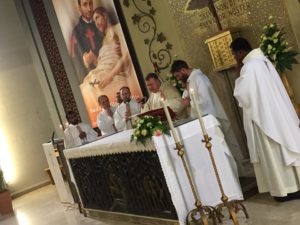 Celebrations presided over by the Vicar General of the Ministers of the Sick, Father Laurent Zoungrana, and by His Excellency Msgr. Lorenzo Leuzzi, the Delegate for pastoral care in health of the diocese of Rome. In the afternoon we prayed for, and with, patients of the hospital, together with the Jesus Loves Community.
Celebrations presided over by the Vicar General of the Ministers of the Sick, Father Laurent Zoungrana, and by His Excellency Msgr. Lorenzo Leuzzi, the Delegate for pastoral care in health of the diocese of Rome. In the afternoon we prayed for, and with, patients of the hospital, together with the Jesus Loves Community.
PHOTOGRAPHIC GALLERY
THE DELEGATION IN MADAGASCAR
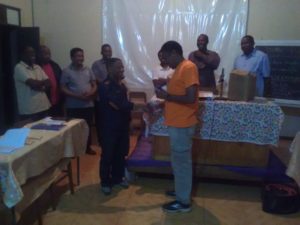 The Union of Providers of Formation (Religious) of Madagascar has a new governing board.
The Union of Providers of Formation (Religious) of Madagascar has a new governing board.
The thirty-sixth general assembly of the Union of Providers of Formation (Religious) of Madagascar took place on 7-11 November 2017 at the Notre Dame de la Salette Spiritual Centre in Antsahasoa of the diocese of Antsirabe.
On 8-9 November 2017 Don Roger RAZAFINIANJA, the Director of the District of Sakalalina of the diocese of Ihosy, animated a session on the role of communication in educational contexts, in particular in houses for the formation of religious. In addition to allowing the thirty-three participants, who came from nineteen male congregations, to examine contemporary realities, the animator sought to help those present to respond to the educational challenges of communication.
On 10 November 2017, after an exchange of information between congregations and regions, the participants proceeded to renew the governing board which had already gone a year beyond the expiry of its mandate according to the statutes: two years which can be renewed only once. The three remaining members of the previous governing board had to engage in a further year of transition. After the six members had been chosen, the by now former governing board, whose president was Father Albert RAINIHERINORO (M.I), handed over the official seal to the new president, Father Gerard RAMAROSON (M.S). Our best wishes for a successful mission go to the new board.
THE DELEGATION IN CHILE
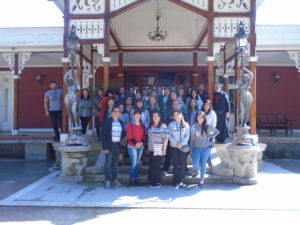 On 2 November Fr. Pietro Magliozzi organised a meeting at the San Joaquin Centre of the Pontifical Catholic University on the subject ‘The End of Life: Spiritual and Religious Support’.
On 2 November Fr. Pietro Magliozzi organised a meeting at the San Joaquin Centre of the Pontifical Catholic University on the subject ‘The End of Life: Spiritual and Religious Support’.
CADIS – QUESTIONNAIRE
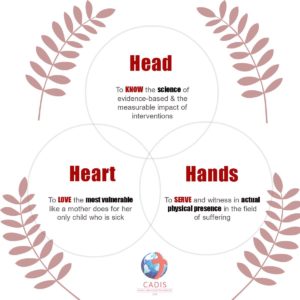 We share with our readers the questionnaire of our Foundation CADIS. We thank those who have been able to reply. We ask those who have not replied to dedicate a little time for the growth of our Foundation.
We share with our readers the questionnaire of our Foundation CADIS. We thank those who have been able to reply. We ask those who have not replied to dedicate a little time for the growth of our Foundation.
The principal purpose of Camillian ministry and witness has always been, from the creation of the Order until today, to offer action and support for the victims of natural disasters or disasters caused by man, including wars. One proof of this is the fourth vow taken by Camillians: the vow to serve suffering humanity even when this places one’s own life at risk.
• In 1995 the fifty-fourth General Chapter that was celebrated at Bucchianico decided to establish a task force with the goal of responding to the social/health-care emergencies of modernity.
• In 2000 the General Consulta appointed the CAMILLIAN TASK FORCE, better known as the CTF.
• In 2015, during the meeting of the Major Superiors of the Order, the General Consulta, in agreement with the Major Superiors and after a careful strategic analysis of the organisation, decided to the institutionalise the CTF. This institutionalisation was approved in the legal form of a Foundation called CADIS CAMILLIAN DISASTER SERVICE INTERNATIONAL.
• In 2016 CADIS was registered at the prefecture of Rome on the register of legal persons, becoming to the full a Foundation.
With the hope that CADIS will become an organisation by which it twill be possible to relaunch a message of hope amongst populations afflicted by, and suffering because of, disasters and inhuman conditions, we propose to make this spirit of initiative increasingly consolidated and impelling amongst Camillian religious and lay people.
For this last reason, we would be grateful to understand from you how much this new institution inside the Order is known about and what, and to what extent, we can improve so as to achieve our primary goal: to make CADIS a further propitious context for religious where the greatest witness to the Christian charism can be engaged in for those who suffer and are in need.
Cf. So many good wishes for a year full of solidarity – CADIS – CALENDAR 2018
KENYA – UGANDA – TANZANIA
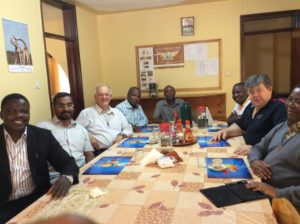 In 2015, during his visit to the religious of Anglophone Africa (East Africa: Kenya, Uganda, Tanzania), the Superior General, Fr. Leocir Pessini, convoked their respective Major Superiors in loco for a meeting on cooperation at the level of formation between the Camillians of that region. On 28-29 November of this year, in Nairobi, Kenya, Fr. Leocir Oessini and Fr. Laurent Zoungrana (Vicar General of the Order responsible for formation) met the Major Superiors of the Camillian communities of Uganda, Tanzania and Kenya and their respective religious responsible for formation with a view to achieving increasing cooperation in formation (interculturality and planning for the future).
In 2015, during his visit to the religious of Anglophone Africa (East Africa: Kenya, Uganda, Tanzania), the Superior General, Fr. Leocir Pessini, convoked their respective Major Superiors in loco for a meeting on cooperation at the level of formation between the Camillians of that region. On 28-29 November of this year, in Nairobi, Kenya, Fr. Leocir Oessini and Fr. Laurent Zoungrana (Vicar General of the Order responsible for formation) met the Major Superiors of the Camillian communities of Uganda, Tanzania and Kenya and their respective religious responsible for formation with a view to achieving increasing cooperation in formation (interculturality and planning for the future).
THE PROVINCE OF BURKINA FASO
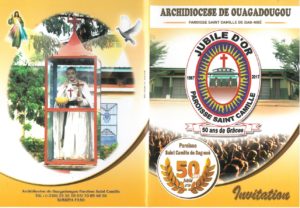 On Saturday 25 November 2017 the religious of the Camillian Province of Burkina Faso celebrated the fiftieth anniversary of the founding of the Saint Camille Parish of Ouagadougou.
On Saturday 25 November 2017 the religious of the Camillian Province of Burkina Faso celebrated the fiftieth anniversary of the founding of the Saint Camille Parish of Ouagadougou.
On 12 November 2017 the Camillians of Burkina Faso celebrated with joy their fifty years of pastoral presence at the ‘Yalgado Ouédraogo’ Hospital of Ouagadougou: fifty years of service to the sick and nearness to, and animation of, the health-care personnel, which began in response to an invitation made by Cardinal Paul Zoungrana, the then Archbishop of Ouagadougou (the Camillians arrived in Burkina Faso in 1966). The jubilee was solemnised with a celebration of the Eucharist presided over by Bishop Joachim Ouédraogo, with the presence of many Camillian religious, Daughters of St. Camillus, and faithful. The principal stages of this long ‘journey’, illuminated by the strength and the appeal of St. Camillus de Lellis, were described.
http://lefaso.net/spip.php?article80384
CAMILLIAN INTER-CONGREGATIONAL MEETING
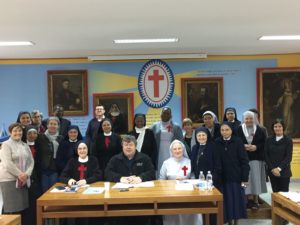 In line with the communion style of the Camillian inter-Congregational approach, on 25 November 2017, at the generalate house of the Daughters of St. Camillus of Grottaferrata (Rome) a meeting of the Superior Generals and their respective councils was organised of the Camillians, the Daughters of St. Camillus, the women Ministers of the Sick, the Handmaids of the Incarnation, and the women Missionaries of the Sick ‘Christ the Hope’. The subject of the meeting was ‘One Charism and Many Faces’ (the charismatic-spiritual area). The aim was to analyse and share the ‘common’ challenges and expectations of our Institutes.
In line with the communion style of the Camillian inter-Congregational approach, on 25 November 2017, at the generalate house of the Daughters of St. Camillus of Grottaferrata (Rome) a meeting of the Superior Generals and their respective councils was organised of the Camillians, the Daughters of St. Camillus, the women Ministers of the Sick, the Handmaids of the Incarnation, and the women Missionaries of the Sick ‘Christ the Hope’. The subject of the meeting was ‘One Charism and Many Faces’ (the charismatic-spiritual area). The aim was to analyse and share the ‘common’ challenges and expectations of our Institutes.
DIARY OF THE SUPERIOR GENERAL AND THE GENERAL CONSULTA
 On 20-24 December 2017, Fr. Leocir Pessini and Fr. Laurent Zoungrana will take part in the meeting of delegates and providers of formation of the Camillian communities of Anglophone Africa (Kenya, Uganda, Tanzania).
On 20-24 December 2017, Fr. Leocir Pessini and Fr. Laurent Zoungrana will take part in the meeting of delegates and providers of formation of the Camillian communities of Anglophone Africa (Kenya, Uganda, Tanzania).
On 5-11 December 2017 – the solemnity of the Immaculate Conception of Mary – the Superior General will be in Vietnam to celebrate the twenty-fifth anniversary of the arrival of the Camillians in that nation of South-East Asia.
From 17 to 27 December 2017 Fr. Aris Miranda and Fr. Efisio Locci will visit the Camillian religious who live and work in the Central African Republic.
THE CAMILLIANUM
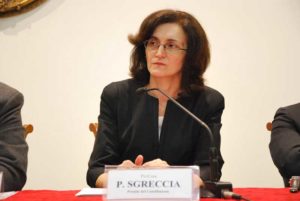 AgenSir: end of life: Sgreccia (Camillianum), ‘we must commit ourselves, through palliative care, to fighting the pain and loneliness that make dying more troubled and painful’.
AgenSir: end of life: Sgreccia (Camillianum), ‘we must commit ourselves, through palliative care, to fighting the pain and loneliness that make dying more troubled and painful’.
‘In recent days Pope Francis emphasised the need for a ‘supplement of wisdom’ in discernment of end-of-life situations. This is an appeal that is as important as ever, not least because the question is increasingly impelling in social, cultural and political fields’. This is what Palma Sgreccia, the Dean of the Camillianum, said about the message of the Pope to the President of the Pontifical Academy for Life on the occasion of the European regional meeting of the World Health Association on ‘end-of-life’ questions.
WOMEN MINISTERS OF THE SICK OF SAINT CAMILLUS
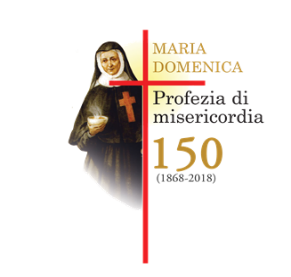 On 22 May 2018 the women Ministers of the Sick of Saint Camillus will celebrate the 150th. anniversary of the death of their Founder, the Blessed Maria Domenica Brun Barbantini, at their generalate house of Rome.
On 22 May 2018 the women Ministers of the Sick of Saint Camillus will celebrate the 150th. anniversary of the death of their Founder, the Blessed Maria Domenica Brun Barbantini, at their generalate house of Rome.
‘OUR HISTORY’– FROM OUR HISTORICAL ARCHIVES
The ‘Apostolic Brief – CUM NOS NUPER’ by which Pope Sixtus V granted St. Camillus the right to wear the Red Cross on the habit of the Order (26 June 1586).
From our Constitution n. 8: ‘St. Camillus, himself a recipient of mercy (cf. Vms 45-6; 55) and tempered by the experience of suffering, following the example and teaching of the merciful Christ, was called by God to assist the sick and to teach others how to serve them. Encouraged by the crucified Christ to continue in the work he had started, he dedicated himself and the Order to the service of the sick. He chose the red cross (cf. Vms 77; 70) as the distinctive sign of his Institute, and gave his religious the name ‘Ministers of the Sick’, inspired by the word of Christ ‘who did not come to be served but to serve’ (Mk 10:45)’.
The Supreme Pontiff Sixtus V Wishes to See Camillus and Gives him the Right to Wear the Cross
CHAP. XXXVIII
It was not only the good memory of Cardinal Mondovi who at the beginning showed himself loving and affectionate towards Camillus, but also other personages of importance, one of whom was Cardinal Sans. He gave a report to the Pope on what had been decided at the Sacred Congregation, he praised him and commended so very warmly this Institute together with the goodness of its founder that the Pope wished to see him and meet this man. After learning of this through Monsignor Cassano, Camillus immediately went to visit the Supreme Pontiff in the Vatican where, after kissing his feet, told him with words full of great simplicity that he was Camillus, a useless servant, who had unworthily been used by God to found that Congregation which had been recently been confirmed by His Holiness. Thus he had gone to give him infinite thanks and to place that Congregation then and for always at his holy feet and those of his successors, and of the Holy Apostolic See. The Supreme Pontiff replied that he was very happy to see him and meet him, and was most content, promising that where this was necessary he would always help them and favour them. With this benevolent reply, Camillus, encouraged, was greatly moved and asked him the grace of being able, he and all the others of his Congregation, to wear a cross of linen cloth above the cassock, and cloak, for their greater distinction, and the other clerics regular. The Supreme Pontiff willingly consented to this saying that it was reasonable that as this institute was different from the others it should have a different habit, whereby he ordered that a memorial be made of this. After this had been done Camillus and represented to His Holiness, it was sent to the same sacred Congregation of Regulars. Where, after Camillus had presented the form and size of the Cross that he wanted to wear painted on a sheet of paper, similarly such a request was deemed necessary. And with yet another apostolic Brief dated 26 June 1958 the right was given to Camillus and his companions to wear the cross (cf. Vms 77-78).
MEETINGS OF THE ORDER OF CAMILLIANS (2014-2020)
DECEASED RELIGIOUS
‘See, now they vanish, the faces and places, with the self which, as it could, loved them. To become renewed, transfigured, in another pattern’ (T.S. Eliot).
Lorenzo Rattin was born on 8 October 1933 in Valle S. Floriano di Marostica (VI). His father, Vigilio, and his mother, Speranza Bragagnolo, had their home in Mottinello di Galliera Veneta (PD). Following in the footsteps of his brother Leonardo, he entered the Camillian seminary of Villa Visconta di Besana Brianza (MI) on 16 October 1944. After junior school he was admitted to the novitiate on 14 July 1949 in Verona in the Casa di San Giuliano where he made his first religious profession of temporary vows on 15 July 1950. On 4 October 1954 he received his diploma from the Liceo Classico delle Scuole delle Stimmate in Verona. For his studies in theology he then went to the major Seminary of Mottinello in Rossano Veneto (VI) where on 1 April 1956 he made his perpetual profession and where on 21 December 1957 he was ordained a deacon by Msgr. Girolamo Bortignon. The same bishop from Padua ordained him a priest in Cittadella (PD) on 22 June 1958. CONTINUE TO READ HERE
Fr. RICHARD LUBAALE (11 May 1978-6 November 2017)
 Richard was born on 11 May 1978. His parents were John and Rose Lubaale. His father died some years ago when Richard was in the novitiate. Richard was the third child of a family of eight children: four brothers and three daughters (Mercy, Loy, Richard, Andrew, Alex, Robert, Emma and John). He was born in Kakira, a village very near to the cities of Jinja and Kimaka where the Camillians have their community. Richard was received into the Order by Fr. Tom O’Connor (the first Camillian missionary in Uganda) and by his vocational team. He spent his novitiate in Kurungu in Kenya and made his first profession on 14 July 2007 in the St. Camillus community of Kiira Rd., Jinja. He was then sent by Fr. Tom O’Connor to the Camillian seminary of Nairobu where he was able to complete his theological studies at Tangaza College in 2010. CONTINUE TO READ HERE.
Richard was born on 11 May 1978. His parents were John and Rose Lubaale. His father died some years ago when Richard was in the novitiate. Richard was the third child of a family of eight children: four brothers and three daughters (Mercy, Loy, Richard, Andrew, Alex, Robert, Emma and John). He was born in Kakira, a village very near to the cities of Jinja and Kimaka where the Camillians have their community. Richard was received into the Order by Fr. Tom O’Connor (the first Camillian missionary in Uganda) and by his vocational team. He spent his novitiate in Kurungu in Kenya and made his first profession on 14 July 2007 in the St. Camillus community of Kiira Rd., Jinja. He was then sent by Fr. Tom O’Connor to the Camillian seminary of Nairobu where he was able to complete his theological studies at Tangaza College in 2010. CONTINUE TO READ HERE.
Sr. Lucila PANDO, a Peruvian religious, died on 1 November 2017 at the Clinic of the Daughters of St. Camillus in Lima, Peru. She was 66 and had been a woman religious for 31 years. She died after a long illness.
Sr. Alessandra RIZZI died on 20 November 2017 at the nursing home of the Daughters of St. Camillus of Cremona. She was 90 and had been a woman religious for 67 years. We commend her to the prayers of all the saints so that she ay enjoy of the Beatitude of Heaven together with them and intercede for the needs of the Church and each one of us.
Fr. Ranzo was born on 30 November 1935 in Trento (although resident in Fornace) to his father Andrea Achille and his mother Anna. He entered the seminary of Villa Visconta in Besana Brianza (MI) on 28 September 1948. On 21 October 1950 he went to the seminary of Marchirola where he completed his secondary-school studies. He entered the novitiate at Verona San Giuliano on 25 1954 and made his first profession of vows on 26 September 1955. He then continued with his studies of the classics and engaged in a preparatory year for theology. He made his perpetual profession on 8 December 1959, was ordained a deacon in Padua on 22 December 1962 by the Bishop of Padua Msgr. Gerolamo Bortignon, and was ordained a priest by the same bishop in Mottinello on 23 June 1963. READ HERE
‘Now they live in Christ whom they met in the Church, followed in our vocation, and served in the sick and the suffering. Trusting that the Lord, the Holy Virgin our Queen, St. Camillus, the Blessed Luigi Tezza, the Blessed Giuseppina Vannini, and our deceased religious brothers and sisters, will welcome them in their midst, we commend them in our prayers, remembering them with affection, esteem and gratitude’.
Obituary – fr. Renzo Roccabruna – EN
******
We reproduce below the Message that the Holy Father Francis sent to those taking part in the thirty-second international conference whose subject was ‘Addressing Global Health Inequalities’, organised by the Dicastery for Promoting Integral Human Development in cooperation with the International Confederation of Catholic Health-Care Institutions (the New Hall of the Synod, 16-18 November 2017).
MESSAGE OF HIS HOLINESS POPE FRANCIS TO THE PARTICIPANTS IN THE 32nd INTERNATIONAL CONFERENCE ON THE THEME: “ADDRESSING GLOBAL HEALTH INEQUALITIES” (Vatican, 16-18 NOVEMBER 2017)
I offer a cordial welcome to the participants in the Thirty-second International Conference on the theme Addressing Global Health Inequalities. I express my gratitude to all those who have worked to organize this event, in particular, to the Dicastery for Promoting Integral Human Development and the International Confederation of Catholic Health Care Institutions.
Last year’s Conference took note of encouraging data on the average life expectancy and on the global fight against pathologies, while at the same time pointing out the widening gap between the richer and poorer countries with regard to access to medical products and health-care treatment. Consequently, it was decided to address the specific issue of inequalities and the social, economic, environmental and cultural factors underlying them. The Church cannot remain indifferent to this issue. Conscious of her mission at the service of human beings created in the image of God, she is bound to promote their dignity and fundamental rights.
To this end, the New Charter for Health Care Workers states that “the fundamental right to the preservation of health pertains to the value of justice, whereby there are no distinctions between peoples and ethnic groups, taking into account their objective living situations and stages of development, in pursuing the common good, which is at the same time the good of all and of each individual” (No. 141). The Church proposed that the right to health care and the right to justice ought to be reconciled by ensuring a fair distribution of healthcare facilities and financial resources, in accordance with the principles of solidarity and subsidiarity. As the Charter notes, “those responsible for healthcare activities must also allow themselves to be uniquely and forcefully challenged by the awareness that ‘while the poor of the world continue knocking on the doors of the rich, the world of affluence runs the risk of no longer hearing those knocks, on account of a conscience that can no longer distinguish what is human’” (No. 91; Caritas in Veritate, 75).
I am pleased to learn that the Conference has drafted a project aimed at concretely addressing these challenges, namely, the establishment of an operational platform of sharing and cooperation between Catholic health care institutions in different geographical and social settings. I willingly encourage those engaged in this project to persevere in this endeavour, with God’s help. Healthcare workers and their professional associations in particular are called to this task, since they are committed to raising awareness among institutions, welfare agencies and the healthcare industry as a whole, for the sake of ensuring that every individual actually benefits from the right to health care. Clearly, this depends not only on healthcare services, but also on complex economic, social, cultural and decision-making factors. In effect, “the need to resolve the structural causes of poverty cannot be delayed, not only for the pragmatic reason of its urgency for the good of society, but because society needs to be cured of a sickness which is weakening and frustrating it, and which can only lead to new crises. Welfare projects, which meet certain urgent needs, should be considered merely temporary responses. As long as the problems of the poor are not radically resolved by rejecting the absolute autonomy of markets and financial speculation and by attacking the structural causes of inequality, no solution will be found for the world’s problems or, for that matter, to any problems. Inequality is the root of social ills.” (Evangelii Gaudium, 202).
I would like to focus on one aspect that is fundamental, especially for those who serve the Lord by caring for the health of their brothers and sisters. While a well-structured organization is essential for providing necessary services and the best possible attention to human needs, healthcare workers should also be attuned to the importance of listening, accompanying and supporting the persons for whom they care.
In the parable of the Good Samaritan, Jesus shows us the practical approach required in caring for our suffering neighbour. First, the Samaritan “sees”. He notices and “is moved with compassion” at the sight of a person left stripped and wounded along the way. This compassion is much more than mere pity or sorrow; it shows a readiness to become personally involved in the other’s situation. Even if we can never equal God’s own compassion, which fills and renews the heart by its presence, nonetheless we can imitate that compassion by “drawing near”, “binding wounds”, “lifting up” and “caring for” our neighbour (cf. Lk 10:33-34).
A healthcare organization that is efficient and capable of addressing inequalities cannot forget that its raison d’être, which is compassion: the compassion of doctors, nurses, support staff, volunteers and all those who are thus able to minimize the pain associated with loneliness and anxiety.
Compassion is also a privileged way to promote justice, since empathizing with the others allows us not only to understand their struggles, difficulties and fears, but also to discover, in the frailness of every human being, his or her unique worth and dignity. Indeed, human dignity is the basis of justice, while the recognition of every person’s inestimable worth is the force that impels us to work, with enthusiasm and self-sacrifice, to overcome all disparities.
Finally, I would like to address the representatives of the several pharmaceutical companies who have been invited to Rome to address the issue of access to antiretroviral therapies by paediatric patients. I would like to offer for your consideration a passage of the New Charter for Healthcare Workers. It states: “Although it cannot be denied that the scientific knowledge and research of pharmaceutical companies have their own laws by which they must abide – for example, the protection of intellectual property and a fair profit to support innovation – ways must be found to combine these adequately with the right of access to basic or necessary treatments, or both, especially in underdeveloped countries, and above all in the cases of so-called rare and neglected diseases, which are accompanied by the notion of orphan drugs. Health care strategies aimed at pursuing justice and the common good must be economically and ethically sustainable. Indeed, while they must safeguard the sustainability both of research and of health care systems, at the same time they ought to make available essential drugs in adequate quantities, in usable forms of guaranteed quality, along with correct information, and at costs that are affordable by individuals and communities” (No. 92).
I thank all of you for the generous commitment with which you exercise your valued mission. I give you my Apostolic Blessing, and I ask you to continue to remember me in your prayers.
From the Vatican, 18 November 2017 FRANCIS
******
MESSAGE OF HIS HOLINESS POPE FRANCIS TO THE PARTICIPANTS IN THE EUROPEAN REGIONAL MEETING OF THE WORLD MEDICAL ASSOCIATION
Your meeting will address questions dealing with the end of earthly life. They are questions that have always challenged humanity, but that today take on new forms by reason of increased knowledge and the development of new technical tools. The growing therapeutic capabilities of medical science have made it possible to eliminate many diseases, to improve health and to prolong people’s life span. While these developments have proved quite positive, it has also become possible nowadays to extend life by means that were inconceivable in the past. Surgery and other medical interventions have become ever more effective, but they are not always beneficial: they can sustain, or even replace, failing vital functions, but that is not the same as promoting health. Greater wisdom is called for today, because of the temptation to insist on treatments that have powerful effects on the body, yet at times do not serve the integral good of the person.
Some sixty years ago, Pope Pius XII, in a memorable address to anaesthesiologists and intensive care specialists, stated that there is no obligation to have recourse in all circumstances to every possible remedy and that, in some specific cases, it is permissible to refrain from their use (cf. AAS XLIX [1957], 1027-1033). Consequently, it is morally licit to decide not to adopt therapeutic measures, or to discontinue them, when their use does not meet that ethical and humanistic standard that would later be called “due proportion in the use of remedies” (cf. CONGREGATION FOR THE DOCTRINE OF THE FAITH, Declaration on Euthanasia, 5 May 1980, IV: AAS LXXII [1980], 542-552). The specific element of this criterion is that it considers “the result that can be expected, taking into account the state of the sick person and his or her physical and moral resources” (ibid.). It thus makes possible a decision that is morally qualified as withdrawal of “overzealous treatment”.
Such a decision responsibly acknowledges the limitations of our mortality, once it becomes clear that opposition to it is futile. “Here one does not will to cause death; one’s inability to impede it is merely accepted” (Catechism of the Catholic Church, No. 2278). This difference of perspective restores humanity to the accompaniment of the dying, while not attempting to justify the suppression of the living. It is clear that not adopting, or else suspending, disproportionate measures, means avoiding overzealous treatment; from an ethical standpoint, it is completely different from euthanasia, which is always wrong, in that the intent of euthanasia is to end life and cause death.
Needless to say, in the face of critical situations and in clinical practice, the factors that come into play are often difficult to evaluate. To determine whether a clinically appropriate medical intervention is actually proportionate, the mechanical application of a general rule is not sufficient. There needs to be a careful discernment of the moral object, the attending circumstances, and the intentions of those involved. In caring for and accompanying a given patient, the personal and relational elements in his or her life and death – which is after all the last moment in life – must be given a consideration befitting human dignity. In this process, the patient has the primary role. The Catechism of the Catholic Church makes this clear: “The decisions should be made by the patient if he is competent and able” (loc. cit.). The patient, first and foremost, has the right, obviously in dialogue with medical professionals, to evaluate a proposed treatment and to judge its actual proportionality in his or her concrete case, and necessarily refusing it if such proportionality is judged lacking. That evaluation is not easy to make in today’s medical context, where the doctor-patient relationship has become increasingly fragmented and medical care involves any number of technological and organizational aspects.
It should also be noted that these processes of evaluation are conditioned by the growing gap in healthcare possibilities resulting from the combination of technical and scientific capability and economic interests. Increasingly sophisticated and costly treatments are available to ever more limited and privileged segments of the population, and this raises questions about the sustainability of healthcare delivery and about what might be called a systemic tendency toward growing inequality in health care. This tendency is clearly visible at a global level, particularly when different continents are compared. But it is also present within the more wealthy countries, where access to healthcare risks being more dependent on individuals’ economic resources than on their actual need for treatment.
In the complexity resulting from the influence of these various factors on clinical practice, but also on medical culture in general, the supreme commandment of responsible closeness, must be kept uppermost in mind, as we see clearly from the Gospel story of the Good Samaritan (cf. Lk 10:25-37). It could be said that the categorical imperative is to never abandon the sick. The anguish associated with conditions that bring us to the threshold of human mortality, and the difficulty of the decision we have to make, may tempt us to step back from the patient. Yet this is where, more than anything else, we are called to show love and closeness, recognizing the limit that we all share and showing our solidarity. Let each of us give love in his or her own way—as a father, a mother, a son, a daughter, a brother or sister, a doctor or a nurse. But give it! And even if we know that we cannot always guarantee healing or a cure, we can and must always care for the living, without ourselves shortening their life, but also without futilely resisting their death. This approach is reflected in palliative care, which is proving most important in our culture, as it opposes what makes death most terrifying and unwelcome—pain and loneliness.
Within democratic societies, these sensitive issues must be addressed calmly, seriously and thoughtfully, in a way open to finding, to the extent possible, agreed solutions, also on the legal level. On the one hand, there is a need to take into account differing world views, ethical convictions and religious affiliations, in a climate of openness and dialogue. On the other hand, the state cannot renounce its duty to protect all those involved, defending the fundamental equality whereby everyone is recognized under law as a human being living with others in society. Particular attention must be paid to the most vulnerable, who need help in defending their own interests. If this core of values essential to coexistence is weakened, the possibility of agreeing on that recognition of the other which is the condition for all dialogue and the very life of society will also be lost. Legislation on health care also needs this broad vision and a comprehensive view of what most effectively promotes the common good in each concrete situation.
In the hope that these reflections may prove helpful, I offer you my cordial good wishes for a serene and constructive meeting. I also trust that you will find the most appropriate ways of addressing these delicate issues with a view to the good of all those whom you meet and those with whom you work in your demanding profession. May the Lord bless you and the Virgin Mary protect you.
From the Vatican, 7 November 2017 FRANCIS
PRAYER FOR THE VICTIMS OF ALL TYPES OF DISASTERS
For all the victims of all types of disasters, for people who have lost their lives, for their loved ones, for the survivors, and for all those who work to provide help, we pray:
God in heaven, who has created and who preserves every existence,
You know all of our sadness and our suffering. May all the victims of all types of disasters be welcomed in your peace! Receive, we pray, in your mercy, our very many brothers and sisters buried by the forces unleashed by nature. Lead them to your home!
Comfort the pain of so many families, dry the tears of so many brothers and sisters, offer protection to the loneliness of so many orphans. Instil courage into everyone so that pain is transformed into a journey of growth and hope.
Generate in the hearts of Christians and all men and women of good will the wish to act so that the wounded and those who suffer because of these calamities experience the comfort of fraternal solidarity.
You who live and reign for ever and ever.
Amen.




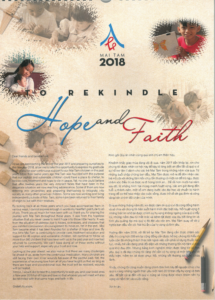
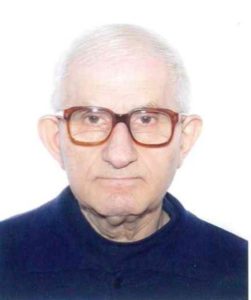
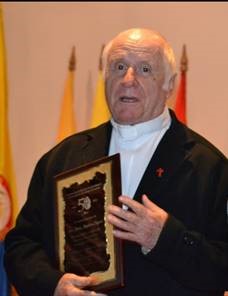
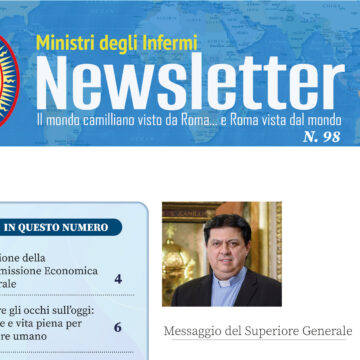
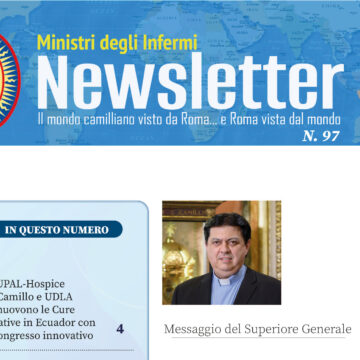


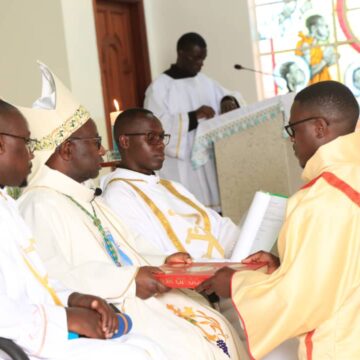
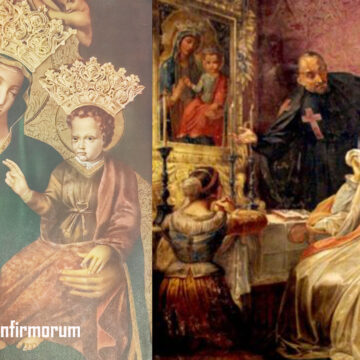

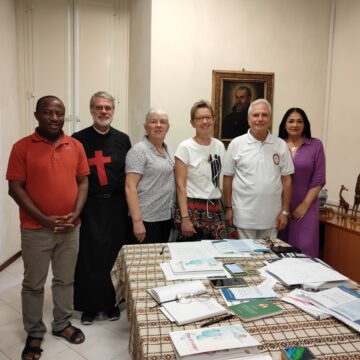

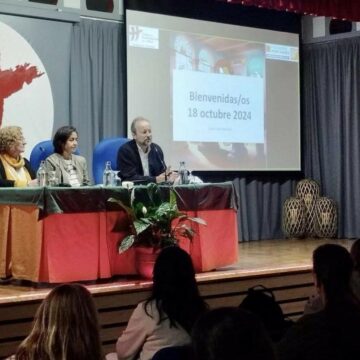
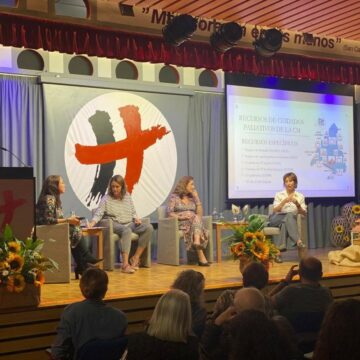
Camillians on Facebook
Camillians on Twitter
Camillians on Instagram